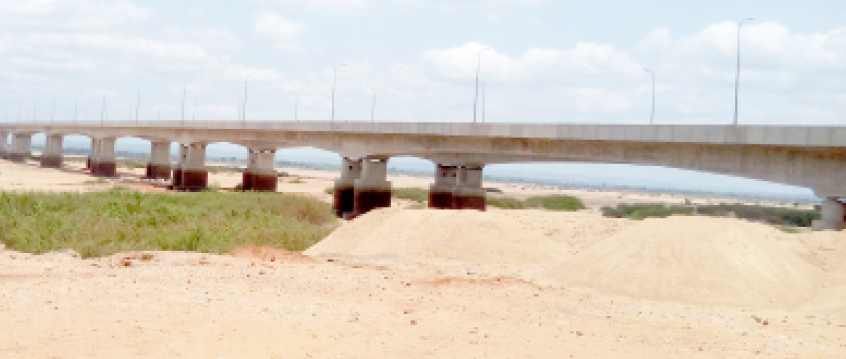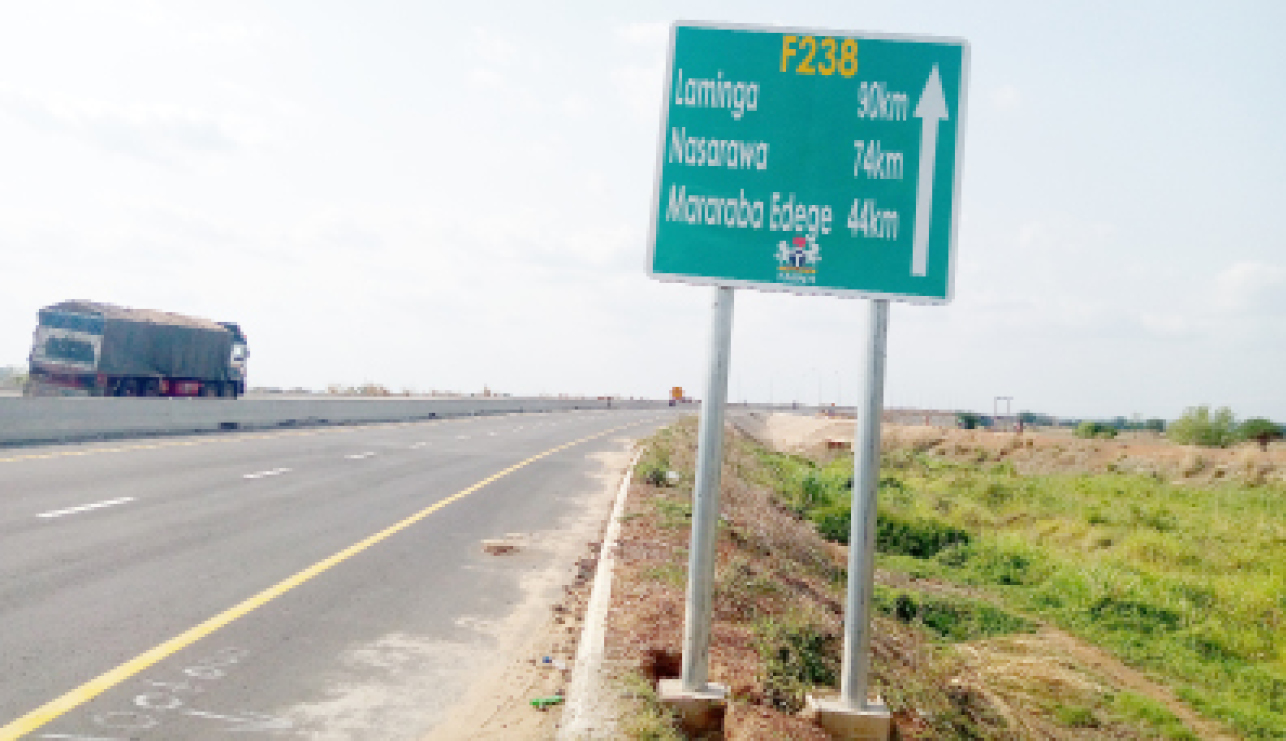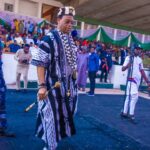The newly constructed 2.055-kilometres bridge forms an arch across River Benue, linking the old colonial town of Loko from the northern bank and Oweto on the southern bank. The bridge, apart from being a sight to behold, has breathed life into the sleepy towns on either side of the river, as they now boom with commercial activities.
It appears to be a twin bridge, with the main bridge measuring 1.835 metres , while the smaller bridge is 220 metres long, bringing the total length to 2.055 kilometres.
Daily Trust on Sunday gathered that aside the construction of the bridge, a 3,850-metre-long approach road is constructed at the Loko end, while that of Oweto axis is 3,090 metres long. Overall, the stretch of road within Nasarawa and Benue that has been rehabilitated is about 74 kilometres.
The bridge, constructed by Reynolds Construction Company (RCC), is more like a monument on the federal highway that runs through the middle of the country from North to South, cutting through many states, from Kaduna up North, down through Nasarawa, Benue and to Enugu in the South East.
- Sudan evacuation: Yet another Nigerian affair
- Doctors’ anti-migration bill and nurturing greener pasture in Nigeria
Travelling on the road from Keffi to Nasarawa through Mararaba Udege to Loko is a pleasurable experience. Apart from the dilapidated portions from Keffi to Nasarawa town, it is a smooth ride from there to Loko and across the border to Benue. Commuters on the road can enjoy the breathtaking scenery of the countryside. Undulating mountain ranges line up the road after Nasarawa and before Mararaba Udege by a village called Gada Hudu, a stream has geographic features like in the Niger Delta. Thus motorists have expressed happiness over the construction of the bridge and the rehabilitation of the road from Nasarawa town in Nasarawa State to Oweto in Benue.
Mr Omale Joseph, who was travelling in his private car to his village in Kogi State from Abuja, said the road had offered him a viable alternative to the Abuja-Lokoja road.
He said, “This is a job well done by the federal government. It is a fantastic experience travelling on the road. It has not only proven to be a better alternative to the Abuja-Lokoja road, it is safer because the traffic here is lighter and there are no security issues on the road. We also spend less travel hours here. So we are excited about the road and the bridge that links parts of the North to the South.”

He explained that he used to take four to five hours to get to his village in Kogi from Abuja but now, he spends just about three hours.
A commercial driver who plies Oturkpo to Kaduna told our correspondent that driving on the road is like being in heaven.
We celebrate this road and the construction of the bridge because it has shortened our journey by five hours. We used to spend over 9 hours travelling from Oturkpo to Kaduna, but now, we spend four to five hours.
Oguche, who had a stopover at Oweto, the southern axis of the bridge, added, “The road has also opened up areas along the road and brought light to the local people. You can see that petty trading is booming here, and it is like that in many villages along the road. So we celebrate this road more than the federal government and wish they can do more of such roads.”
Daily Trust on Sunday gathered that before the bridge was constructed, motorists who were plying the route used to rely on wooden boats to ferry their vehicles and passengers across River Benue.
And Oguche said, “It was a tortuous and scary experience. Before the road was rehabilitated, there were portions filled with water during the rainy season and pools of water used to spoil our vehicles, such that we would frequently visit mechanics for repairs.”
He also said the road was infested with robbers and kidnappers who took advantage of the failed portions to rob drivers and passengers and even kidnap them sometimes.
“But we don’t experience those crimes on the road again; that is our joy. We know what we used to face in those days,” he said.
Traders who patronise village markets along the road also expressed excitement over the construction of the road, saying it has made it easier for them to carry out their businesses. Some were seen returning from Mararaba Udege market where they went to sell different goods, to Keffi, Masaka and even Nyanya in the Federal Capital Territory (FCT).
Tony Obinna, a trader who went to Mararaba Udege market from Masaka, near Abuja, said it was easier going to such markets to do business.
“There are lots of markets along this axis, but before the road was repaired, it was difficult coming and going. It is now less stressful,” he said.
Daily Trust on Sunday learnt that transport fare has also dropped since the road was rehabilitated and the bridge opened for use.
Some commuters who spoke with our correspondent said a journey that used to cost N5,000 would now cost about N3,500, while those that used to cost N3,000 now go for about N2,000.
Meanwhile, the Barden Loko, Alhaji Suleiman Bala Loko, said the road reconstruction and the bridge had brought tremendous benefits to the town, adding, “Prior to now, it was difficult coming to Loko and equally difficult getting out of here,” he said.
He said community leaders, especially the Emir of Loko, Alhaji Abubakar Ahmed Sabo MaiLoko, lobbied politicians for the construction of the bridge and the renovation of the road.
The Barden Loko said the old town’s proximity to Abuja, the country’s capital, was now short, and it is easier for members of the community to get around the country.
“Loko used to be a town of mostly indigenous people, but now, it is becoming multicultural and cosmopolitan because many people from other places are coming here to do business. Business people are setting up water producing plants and others are coming to set up farms, while others are coming to buy fish and farm produce,” he said.
He added that some traders in the town now go to Benue, buy yam and rice and come back to sell in Loko, saying business is booming in the town because of the new bridge.
He also said the RCC employed over 100 residents of the town while constructing the bridge, which also brought succour to the old colonial town.
Another resident of the town, who is a biker, Hamza Isiaka, said the areas around the bridge had come alive because of frequent movement of people and goods from the Nasarawa end to the Benue axis; and they make brisk business conveying them.
“Our business is booming because the number of people and volume of goods moving across the bridge is now higher than it was in the past. Then, people relied on boats and canoes to cross the river; and it is not everybody that likes crossing the river in a boat or canoe,” he said.
Our correspondent observed that there is a fish market on the southern bank of the bridge at Oweto, where sellers make quick sales as commuters stop over in numbers to bargain and buy the assorted freshwater smoked fish on display. Those who are hungry also grab some snacks and drinks while their vehicles make brief stops.
A fish seller, Mrs Comfort Okede, said the fish market was thriving; and she makes good sales now that the road is busier with traffic.
“More people stop over here to buy our fish than before when vehicles and passengers were being ferried across the river in boats. They used to take a bush road upstream where there is a crossing; so, only few people came here to buy fish,” she said.
The Minister of Works and Housing, Mr Babatunde Raji Fashola, a Senior Advocate of Nigeria (SAN), had in April asked Nigerians to be proud of the Loko-Oweto bridge and road project.
The minister said the bridge was 200 metres longer than the second Niger Bridge, and that the road played a strategic role in the economic development of the country.
And now, as if in response to his call, the communities at either side of the bridge are truly proud to have such a gigantic project in their domains.
Also, during the inspection of the project in January 2023, Fashola said, “Understandably, there is a lot of emotions and excitement going on about the second Niger Bridge. People forget that the bridge crosses River Niger and it is an East-West crossing as it links the east of Nigeria to the western part.
“There is also a second major river in Nigeria – the River Benue. It is a North-South crossing.
“So, while there is a lot of publicity and excitement about the second Niger Bridge, perhaps not enough attention has been beamed on the Loko-Oweto bridge.”

 Join Daily Trust WhatsApp Community For Quick Access To News and Happenings Around You.
Join Daily Trust WhatsApp Community For Quick Access To News and Happenings Around You.

